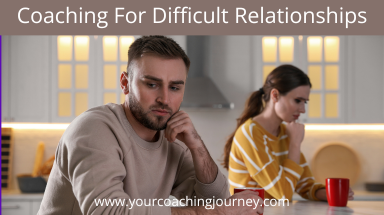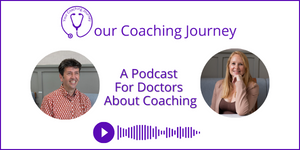Prefer to listen?
This blog post forms the basis of our podcast on coaching around relationships, which you can listen to here.
Do relationships belong in the coaching room?
Some coaches may struggle a little if a coachee broaches the subject of relationships. They may feel either that they are not qualified to help, or that it’s something they wouldn’t expect in the coaching room. Likewise, some people would rather stay away from emotions. They don’t think it’s their place as a coach. So, they’re not really sure where to take the conversation. But, whether we like it or not, relationships are going to be there in the coaching room with us a lot of the time. Everyone is involved with other people, whether that’s at work or in their social life. People are interacting with other people all the time and are in relationships of some description. And those relationships are always changing. And if some people don’t like those changes, then that can cause friction.
If we think about a doctor’s practice, not only do doctors have relationships with their patients, but they also have relationships with other doctors in the practice, the administration staff, with the practice manager, with the pharmacist.
And relationships can sometimes be problematic, so why wouldn’t they come into the coaching room? Why wouldn’t they be part of the conversation around a situation that’s perhaps challenging or changing?
Quite often people won’t come to coaching with the relationship as the first thing they want to talk about, but it may be lurking in the background. Sometimes it can be difficult to talk about relationship issues but it can also be really powerful and have a big impact on the person you’re working with to help them resolve any issues.
How do difficult relationships show up in the coaching room?
It might not be the first thing that people talk about, they might have something else to resolve, productivity issues, for example, so they might talk about that to start with. But if there’s a relationship issue or conflict, people will talk about it eventually; they’ll tell you their story.
There may be a need to build trust and rapport, for them to test the coaching relationship or the process of coaching with other topics and then they will introduce any difficulties they feel they are having with relationships. Because it can be quite a personal conversation to have.
And if you are coaching within an organisation, they have to trust your relationship because they don’t know what the consequences might be if they’ve talked about someone else. So obviously we always reassure people that coaching is a confidential conversation, but until they have the trust in that process, then why would they tell you something about someone else in the organisation unless they’re confident that it will remain confidential?
How might we approach a coaching conversation about relationships?
No. 1 Listen!
As a coach, we’re going to listen to their story. They will see and tell it from their perspective. They may paint themselves as the hero in the story or the victim in the story. And they may paint the other person as problematic in some way. Maybe evil, maybe incompetent. We’re simply going to listen, and not interrupt them, we are going to let them let it all out. They’ll probably play back a dialog of a conversation they’ve had with someone and say, ‘well, this happened and then they said this’ and we’re not going to interrupt that. We’re just going to listen, and hold that space, and we’re going to reserve judgment on the situation.
No. 2 Fact-Finding & Perspective
Then we’re going to start to question some of what it is they’ve said and invite them to see it from a different perspective. We generally don’t stop to see a situation from someone else’s perspective when we’re in it. And generally, we will have talked to other people about. The story gets retold several times, so it will be embedded.
Your coachee will know the story, they’ll just be able to trot it out, and will possibly be elaborating on some of the elements each time they tell the story, so it gets to be a bigger story and they’re more in the right and the other person is more in the wrong. The problem with that is that there is no new thinking going on. That is the story, that is the truth. There is no wavering from that. Typically, friends won’t challenge that narrative. They’ll just say, ‘oh my goodness, that’s terrible, poor you’. They may well also add some personal advice in there, ‘You know what you need to do? You need to tell him this, tell them this’.
It’s very rare to find a friend that will challenge your thinking around a story. Generally speaking, they will just back your story up. And then you build on it more and it becomes a bigger story. In the coaching room, we obviously have a degree of objectivity. Often just playing back what you’ve heard can sometimes make people stop and reflect and think that maybe they could have handled it in a different way. And that’s when we break that cycle of what’s happened before in the retelling of that story.
So how else might we explore the relationship issue once we’ve got to that point?
We might start to challenge some of the detail of the story. If there are some inconsistencies in the story we can start to challenge some of that. And if people are making assumptions about what the other person is thinking or why they’ve taken a certain action, we can challenge that too. People don’t know what’s going on in the other person’s head. And so they start to fill in that part of the story. So, it’s useful to not only look for inconsistencies in the story, but to ask what is real about what’s been said. What do they know as a fact out of this story? And what are the gaps that they’re filling in with assumptions and mind reading.
Where do we go from there?
- Try some new shoes on: it’s useful to invite the coachee to step into the other person’s shoes and talk as though they are the other person. It is a bit odd to do this, but there is often some real power in it.
- Understanding Inter-personal dynamics: In a previous article and podcast episode, we have talked about the parent adult child model, and the drama triangle and those models could be useful to help clients explore the situation further and perhaps understand it differently. To think about how they’re showing up and the stance that they’re taking, whether that’s an adult response to what’s actually happening in that relationship or whether they’re dragging something through from what they learned as a child.
- It may also be useful to explore the coachee’s conflict style with them. This is the topic of another article and podcast episode and helps people to understand how they generally show up when there’s some form of difficulty or conflict.
- Personality styles is quite often an area to look at further where there’s a personality clash. If you’ve got an extrovert who’s being really loud and your coaching client is an introvert and they find this person to be frustrating because they’re always talking, they’re always interrupting. It could just be a difference between introvert and extrovert personality. So it can be really helpful in the coaching room to explore their personality, find out what their preferences are, how they like their world to be and whether they’re in an environment where that’s not happening. It might not be the other person’s fault. It’s just there’s a clash of personalities. Often organisations will do those personality quizzes and questionnaires anyway, so they might know the dynamics and just need a reminder. That knowledge might be enough to let things go or to handle things differently in the future.
- Values is also an interesting area to explore with coachees: finding out what’s really important to them and what they have come to expect from others, and their work colleagues, teams, or managers. It could be that there’s a clash there. Values comes up so much in coaching because it’s such an intrinsic part of who we are. And when our values get trampled on, usually by other people who have different values, it can cause problems. It’s important to recognise that just because your values are your values, it doesn’t mean they’re somebody else’s values. We can’t impose our values on other people. There has to be a little bit of give and take. But where we have strong values and we want the world to fall in line with them, then it might be that that’s a big issue in relation to someone else and the way they organise their life and the behaviours that they demonstrate.
- Change could also be a topic of discussion. We all react to change differently depending on how we’re being impacted by it and it’s worth exploring change with a coachee if there is a difficult relationship, especially if it had been fine previously.
Moving forward with a difficult relationship
When it comes to the way forward with a relationship, asking one of our favourite questions: ‘What would you like to have happen?’ is really useful. It helps your coachee to have a sense of what they want. They can then have a conversation with the other person and hopefully figure out a way to make that happen or at least compromise and be able to move forward together.
And it’s interesting not only to think about what they want to have happen, but also:
- What would they like for themself in this relationship?
- What would you like for the other person?
- And what would they like for the relationship?
Because, quite often they’re just in that adversarial role with the other person and they’re refusing to see it from their perspective. If they want some form of relationship going forward answering these questions will sometimes change the way they handle it.
There are myriad of ways we can go with relationships. As in any coaching scenario there’s always a number of approaches you can take, but we’ve given lots of ideas around as to how we can explore relationships and raise the awareness of our coachee, helping them to gain new insights, new perspectives, and then start to look at how they can come out of the scenario. It’s all about generating new thinking.
Within a coaching context, we offer the perfect environment for people to explore what’s going on and arrive at a good place with it, and then to go and have the conversations that it would be good to have and to find a new way forward or even just to have a new understanding and maybe not feel quite so rubbed up the wrong way by that person. Alternatively, they might choose not to have a relationship with that person. And as coaches, we’re not attached to the outcome. It’s for them to decide what is right for them. We don’t have to fix the relationship, but encouraging some new thinking is good.
To find out more about our Doctors’ Transformational Coaching Diploma click through here




